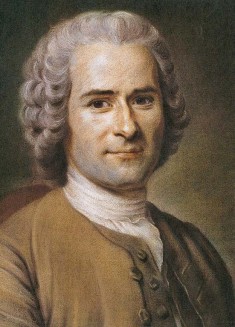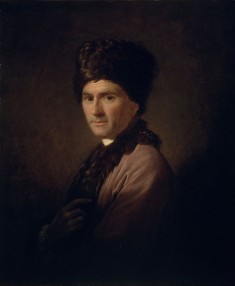| Jean-Jacques Rousseau | |
|---|---|
 |
|
| Philosopher | |
| Specialty | Political philosophy |
| Born | June 28, 1712 Geneva, Republic of Geneva |
| Died | July 2, 1778 (at age 66) Ermenonville, France |
| Nationality | Genevan |
Jean-Jacques Rousseau can be considered both an influential and controversial philosopher. Rousseau’s beliefs were strongly influential in overthrowing the oppressive monarchy that ruled France in the 18th century. Questions do linger as to whether or not his philosophy contributed to the brutal Reign of Terror that followed the French Revolution soon after.
Early Years of Rousseau
Jean-Jacques Rousseau was born on June 28, 1712, in Geneva. He was born of middle-class origins and was very proud that the city/state of Geneva allowed people of his class to possess voting rights. This pride likely contributed to the emergence of his philosophy over time.
Granted, voting rights were not given to everyone in Geneva and an argument can be made the city/state was an oligarchy. We do not know much about his young life as the main reference for it was the posthumously published work Confessions. However, we are able to see a somewhat clear picture of his life and influences.
Rousseau’s father sold their family home, but squandered what he made on the sale. This led the family to move to a more humble location known for its high population of craftsmen. Young Jean-Jacques Rousseau would notice the craftsmen may have lacked the polish and aesthetic skills of artists, but he respected their work ethic. Slowly, he began to see artists as those who served the idle folly of the wealthy.
Developing Ideas and Beliefs
Young Rousseau would also become a lover of the written word. He read voraciously and concentrated a great deal on works that deal with history and escapism. This certainly contributed to his desire to become a writer himself.
Rousseau also kept a watchful eye on the local militias whom he had a great deal of respect for. He did not like the armies of the ruling class because he saw them as thugs for the powerful and wealthy.
As a teen, he was disowned by his father and he had to work various jobs to support himself. As he grew older, he delved into the study of music, math, and philosophy.
The Philosophy of Rousseau
 In the 1750s, Rousseau published a number of very influential philosophical works such as The Discourse on the Sciences and the Arts, A Discourse on the Origin of Inequality, Second Discourse, A Discourse on Political Economy, and more. What was most interesting about Rousseau’s philosophy was the cynicism present in it. Unlike other philosophers who saw their material as a ray of hope contributing help to the world, Rousseau created works that were dark and almost depressing.
In the 1750s, Rousseau published a number of very influential philosophical works such as The Discourse on the Sciences and the Arts, A Discourse on the Origin of Inequality, Second Discourse, A Discourse on Political Economy, and more. What was most interesting about Rousseau’s philosophy was the cynicism present in it. Unlike other philosophers who saw their material as a ray of hope contributing help to the world, Rousseau created works that were dark and almost depressing.
Rousseau did not even like philosophers very much. He saw them in a negative light and felt they mainly contributed to social decay and tyranny. In a sense, they were perceived to be the errand runners of the ruling class. Rousseau was a strong believer in human freedom. He felt the natural order of human beings was to do good for others. However, the negative influences of society lead to corruption.
Within his work, there was a notion that materialism had a very profound and troubling effect on the human psyche. People were too concerned with what others thought of them. Attempts to raise one’s stature in society were born of trying to change the opinions of others. It would seem Rousseau preferred people looked more towards retaining their organic state in nature.
The Social Contract
The greatest work of Jean-Jacques Rousseau was Of The Social Contract, or Principles of Political Right, a work that noted people must be sovereign and free. Only governments and rulers who ensure the liberties and freedoms of the populace would be ones that were legitimate. Such thinking had a profound effect throughout Europe.
The French Revolution
Philosophers do have followers and so did Rousseau. These followers were many of the influential figures of the French Revolution who overthrew their tyrannical monarchs. Robespierre, for example, was highly influenced by Rousseau although Robespierre’s ideas were highly radicalized as evidenced by his actions during the Reign of Terror.
Rousseau’s Death
Jean-Jacques Rousseau passed away on July 2, 1778. His influence of political philosophy still resonates to this day.